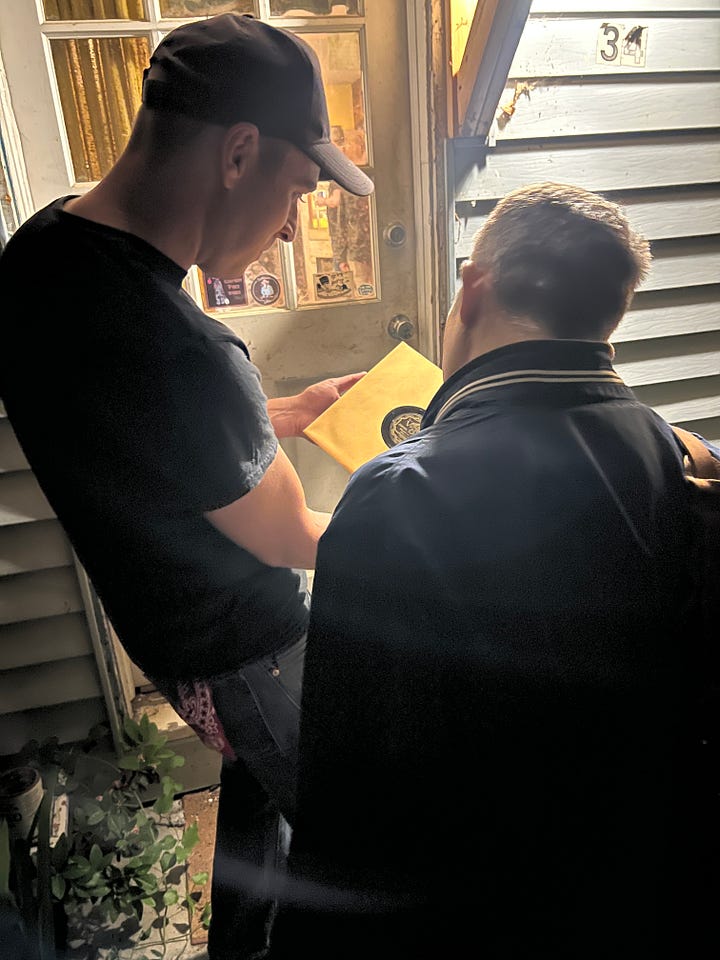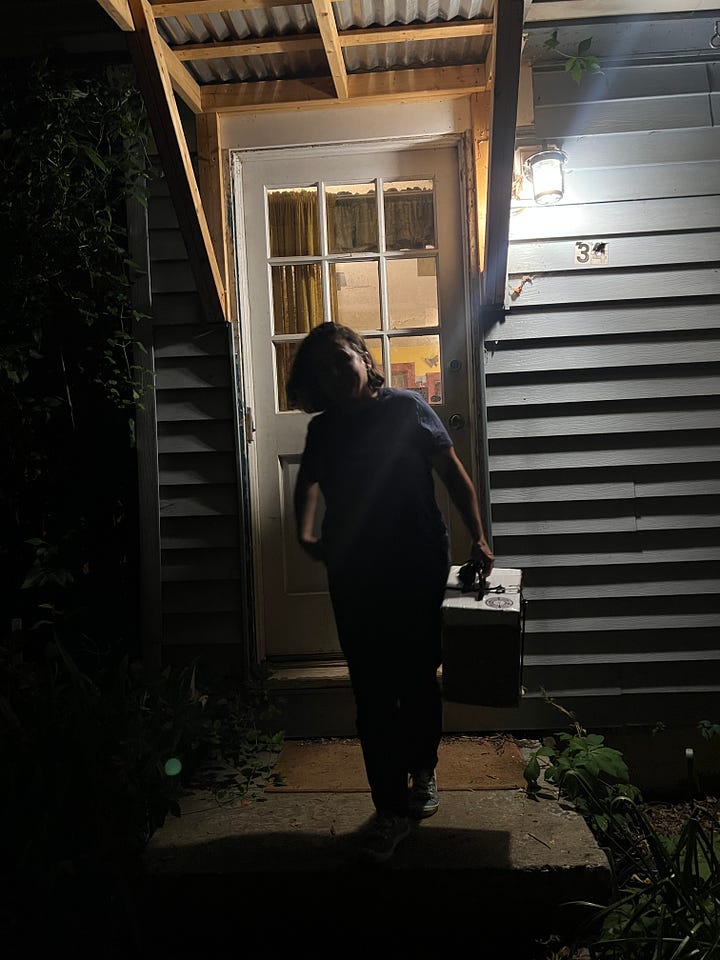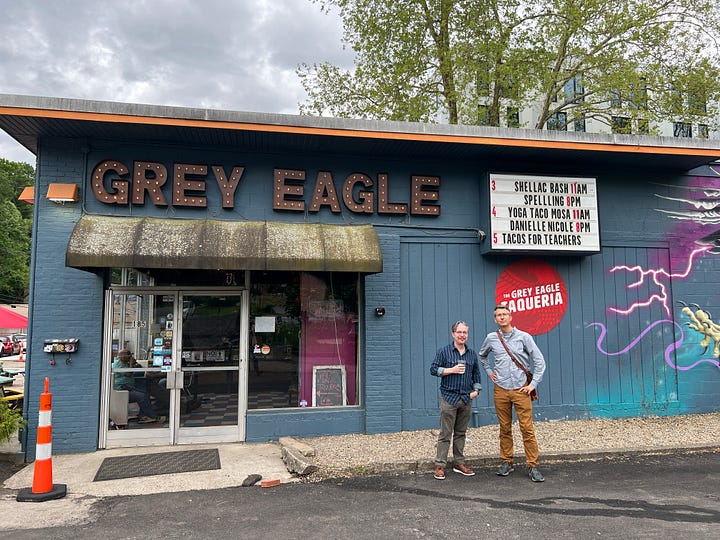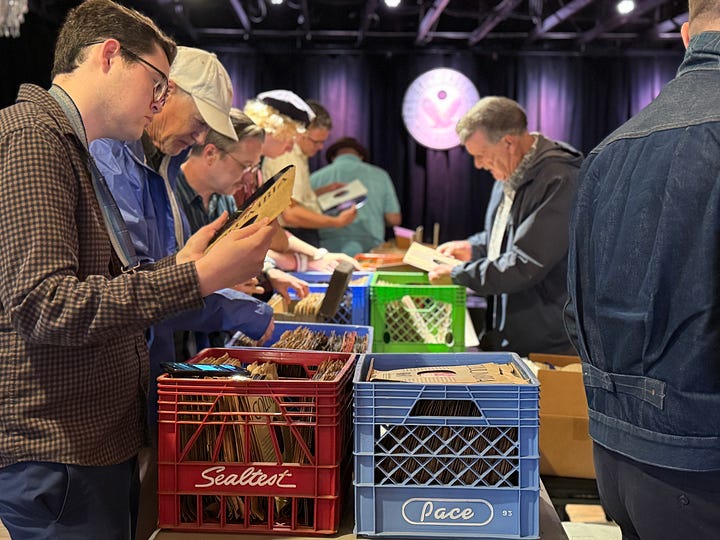The Spirit of 78s: A Record Party and Remembering Frank Mare
Celebrating community, collecting, and the man whose records helped shape our sound.
Dust-to-Digital began with 78rpm records. A format so obscure that the music from those records was incredibly hard to hear, largely unknown, and on the verge of being lost to time. The inaccessibility of the format was in no way a reflection of the quality and power of the recordings. It seemed unfair that these remarkable performances and the artists' stories would be lost to time. This inspired Dust-to-Digital co-founder Lance Ledbetter to begin releasing these recordings.
Beginning in the late 1990s, Lance reached out to record collectors to find the recordings for the company’s first release, Goodbye, Babylon. The relationships forged through that process set Dust-to-Digital on a path to collaborate with 78-rpm-record collectors to this day.
Earlier this summer, Lance and I went to the Asheville Shellac Bash — a gathering of early 20th-century music lovers. The music of this era was made available and popularized on 78 rpm shellac discs.
In 2017, Hunter Holmes and Brody Hunt held the first “Bash.” I recently caught up with Brody and he shared the inspiration for this gathering, “We started the Asheville Shellac Bash because we just wanted to have a big party. Where collectors and researchers and fans of old vernacular music on pre-war 78s could get together in a casual, non-stuffy atmosphere without any lectures."
By pre-war, Brody is referring to records released before World War II. Discs of that era were sold in paper sleeves with little to no information about the artists and songs other than what was printed on the record label. As a result, enjoying music from 78s often comes with the added endeavor of sleuthing for information about the recording. This tends to nurture an academic attitude towards music from this era. But rather than focusing on research and lectures, the Asheville Shellac Bash is focused on the fun, and as Brody said, a “party!”
In line with that spirit, this year’s Bash kicked off with a welcome party at the home of Brody Hunt and Erica Krizen — nestled in a woodsy Asheville neighborhood with a record player ready to spin, a steamy pot of gumbo on the stove, and coolers packed full of ice and beer. Collectors filled the house, each waiting for their turn to drop the needle and play the record they chose to share. The energy was high and the records played late into the night.


Lance and I caught up with a lot of people over the course of the weekend. One person we met was an enthusiastic young collector named Ethan Kelly, who drove all the way from Michigan to attend the Bash. A few days after returning home, we spoke with Ethan for our upcoming podcast. He shared how his passion for jazz, blues, and early recorded music led him "down the rabbit hole of going into moldy basements" and into the world of 78-rpm-record collecting.
For our second day in Asheville, Lance and I hung out with friends and collaborators Sarah Bryan, Jon Ward, and Rayna Gellert. We roamed the city, letting our conversation, pit stops for delicious food, and interesting books be our guideposts for the day.
We had dinner at Chai Pani, which now occupies the space that was once home to my favorite barbecue restaurant, Buxton Hall Barbecue. I loved Buxton Hall! They served some of the best Carolina style barbecue and side dishes - hash, Brunswick stew, lima beans, and Cheerwine slushies. Sadly, they closed in late 2023. But recently, I found out that Elliott Moss, the chef from Buxton Hall, has opened a new BBQ restaurant in his hometown of Florence, South Carolina. It's called Elliott’s BBQ Lounge. I’m so happy to know that the spirit of Buxton Hall lives on.
After dinner, the Shellac Bash continued with a spirited performance by the string band Forty Drop Few and a screening of films from Joe Lauro’s Historic Films Archive.
Saturday morning came quickly, kicking off with a record show at The Grey Eagle Music Hall. Many people came early. Dealers set up their tables while anxious buyers hoped to be first to flip through a crate of records. It's an ecosystem, a dusty ecosystem. Newer collectors, like young Ethan, are often the most outwardly enthusiastic and perhaps the least selective. While seasoned collectors have a more stoic attitude and make discerning decisions in regard to their collection. Some people show up to be part of the old-time music jam session, while others are more interested in socializing - there’s room for it all and all are welcome.


At the Record Show, we connected with long-time friends Malcolm and Maureen Vidrine who also drove up from Georgia for the Shellac Bash.
Malcolm’s perspective on the Bash, “Record collectors, generally aren't the most well-adapted social creatures, so to get into a place like the Shellac Bash where you can talk about things you're interested in and other people are interested in what you're saying, and vice versa. It just doesn't happen that often.”
Lance and I first met Malcolm back in 2003 when he would buy copies of Dust-to-Digital’s first release, Goodbye, Babylon, for his mail order business, Venerable Music. Malcolm would stop by my sister’s then-vacant condo that Lance and I were using to assemble the box sets to buy copies for resale. We quickly became friends.
In the early days of mine and Lance's friendship with Malcolm, we often visited Frank Mare, a 78-rpm-record collector living in nearby Covington, GA. Frank had one of the best collections of pre-war Country Music in the world. Malcolm was eager to learn about the world of 78 record collecting. The two became close friends. Malcolm thanks Frank for teaching him about collecting 78 rpm records. It helped him launch Venerable Music which in 2009 expanded their offerings to host monthly record auctions specializing in 78-rpm records. Frank’s generosity also helped preserve and circulate a major body of pre-war country music, shaping how that music is accessed and appreciated today.
Frank Mare passed away on May 8, 2025. I recently asked Malcolm to share his memories of Frank. Here is a short edit of that conversation.
Interview with Malcolm Vidrine
A Collection Begins
April: Do you know when Frank started collecting?Malcolm: Yeah, in his teens. Some of the first reissue LPs ever done he had got as a teen and listened to 'em all the time and loved that kind of music.
There was a very early collector, Jake Schneider. They called him Jake “The Snake” Schneider. He's got a story written about him in one of the 78 Quarterly’s. But this guy, in the fifties, was able to get into a lot of 78 leftover store stock from companies that were going out of business or stopped messing with 78s. So he had this building that was full of 78s and at that time everyone wanted country blues. But Frank loved country so he was able to get all of these store stock Columbia's and Victors and stuff from Jake at low prices. There weren't many people interested in that stuff so he got a lot of his early, amazing records. They were all like brand new.
April: That's wild.
Malcolm: When Frank and I worked on the Carter Family reissue set for Richard Weise and Bear Family, Richard told Frank that he had the best condition, Carter Family records as a whole. So they used most of the stuff in Frank's collection.
And that’s because Frank was out there, he wanted all the Carter Family records. He wanted all the Jimmie Rogers records. And that didn't become heavily collectible until the ‘70s and even a little later than that.
Money's Not Worth Anything
April: How tuned in was Frank into the value of his records?
Malcolm: ‘Cause Frank never sold his records the only reason he cared about value was because it made it harder for him to afford things. He always had the saying that money's not worth anything because you can always get more of it, but records have the value, the scarcity aspect of them. So anytime he could trade dollars for records that were scarce that's what he would want to do.
I also remember many times he told me when I was investing money in records, he was like, the bottom could fall out of records at any time.
The thing that I notice, 'cause now that I sell LPs as well as 78s, 78s are so much easier to sell. They're scarcer and the collectors of them collect with an urgency.
April: How many records were in Frank's collection would you say?
Malcolm: I think it was about 7,000 records.
April: How would you describe Frank's collection?
Malcolm: The collection was probably 70 to 80% country and one of the best pre-war country collections ever put together. There are few like it. It really was a true representation of the scope and breadth of pre-war country music.
April: Do you feel like when you met Frank and started spending time with him that you reignited his interest in acquiring new records?
Malcolm: Oh, absolutely. Frank grew up in a time where he could, on a weekend, point to several small towns in Georgia and just drive there, hit the antique stores and find 78s to look at. You didn't always find great stuff to buy, but there was always stuff to see at least.
By the time I met him and we started collecting, he was basically of the mind that you couldn't do that anymore. You couldn't just go to an antique store and expect them to have 78s.
What I would do is I call all the antique stores in an area and I would ask them about Victrolas. The best place, if you had any chance of really finding rare records was from a machine that sat in someone's house for years and years. I started getting lucky and telling Frank about it. Then I would set up these trips on the weekend, go pick him up and we would drive to Tennessee, north Georgia, or south Georgia. Anywhere that was a day trip.
April: How would you describe Frank as a collector?
Malcolm: Frank was so generous with sharing his collection. He did so much for the community for that period of time. I bet a lot of the stuff that you find on the internet now are still just rips made from rips made from Frank's collection. It was Frank's work originally that made a lot of that stuff possible.
I miss him.
Malcolm shared this brief video from Frank’s record room, which gives a sense of the atmosphere and what it was like to listen with him.
Want to hear more of my interview with Malcolm? The extended audio version is posted below.
The Dust-to-Digital Foundation has digitized the Frank Mare record collection. Thanks to the generosity of our donors, we have been able to keep Frank’s unique and outstanding collection preserved. We are partnering with the University of California at Santa Barbara, to share these recordings online. We will be making a formal announcement about this partnership soon!
Please consider supporting the Dust-to-Digital Foundation by making a donation today or becoming a paid subscriber of our Substack.







It is hard to over-state the historical importance of Lance and April and Dust-to-Digital's work. Thank you for this wonderful update and for all D-to-D is doing.
I loved Frank's show "Moonshine In The Morning" on WKCR in NY. 1970's